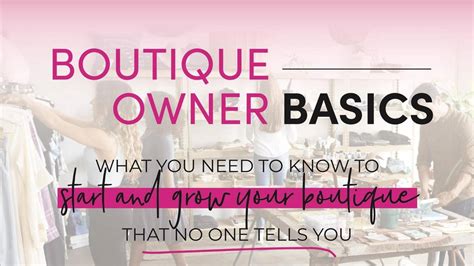Boutiques have become a popular destination for shoppers looking for unique clothing styles and accessories. But why is it called boutique? In this article, we’ll explain what a boutique is, and why it has become such a popular retail concept.
A boutique is a small retail store that focuses on selling specialized clothing, accessories, and other items. Boutiques usually specialize in a particular style or fashion, such as retro or vintage, and often have unique and limited-edition items. Boutiques are also known for their personalized customer service.
The word boutique is derived from the French word “boutique,” which means “shop.” In the late 18th century, fashionable Parisian women would shop in small, independent stores that offered unique clothing and accessory items. These stores became known as boutiques, and the term has since been used to describe any type of small, specialized retail store.
Today, boutique stores are popular because they offer unique clothing styles and accessories that cannot be found in larger chain stores. Boutiques also provide shoppers with a personalized shopping experience, as they are typically staffed by knowledgeable employees who can help customers find the perfect item.
In addition to clothing and accessories, many boutiques also offer home décor items, jewelry, and gifts. This makes them popular destinations for shoppers looking for unique items for their homes or as gifts for friends and family.
Boutiques are a great alternative to traditional retail stores, as they offer shoppers unique items and a personalized shopping experience. Whether you’re looking for something special for yourself or for someone else, a boutique is a great option for finding that one-of-a-kind item.
Unpacking The Meaning Of Boutique
What is a boutique? “Boutique” is a French term that means a shop, or retail outlet, that specializes in apparel, accessories and other goods. It is usually small in size and has a unique selection of items, unlike a large department store.
The term boutique has become synonymous with fashion and luxury goods. Boutiques typically offer designer or high-end clothing and accessories. They are known for carrying unique, stylish items not found in larger department stores. Boutiques usually focus on a certain look or trend, such as bohemian, classic, or modern, and have a more curated selection of items than a typical department store.
Boutiques often have a higher price point than the larger stores. This is because the items they carry are usually of higher quality and are more unique. They also often have a more personalized shopping experience, where the staff is knowledgeable about the items they carry and can offer helpful advice on the best items for your needs.
When shopping in a boutique, you can expect to find a wide selection of items from clothing and accessories to shoes and home decor. You can also find one-of-a-kind pieces that you won’t find anywhere else. The items in a boutique are unique, stylish, and often times of higher quality than what you would find in a department store.
Boutiques are a great way to find unique, stylish items that will help you stand out from the crowd. They offer a unique shopping experience with carefully curated items and personalized service. With a little bit of research, you can find a boutique that offers exactly what you’re looking for.
Discovering The Niche Of Boutique
Have you ever wondered why the term “boutique” is so popular? Boutiques are small, independent stores or shops that provide specialty products to their customers. The term “boutique” has come to signify its own unique type of shopping experience, distinct from traditional retail outlets. The boutique is different from other shopping experiences because it offers a personalized approach to buying, with carefully curated collections of unique items. Boutiques are the perfect place to find one-of-a-kind items, or to discover new trends and styles.
In order to understand the concept of the boutique, it is important to look at how it has evolved over the years. The term “boutique” originated in the mid-19th century, when independent stores selling special items began to emerge. These stores typically specialized in a certain type of product, such as clothing, jewelry, or home décor, and they quickly became popular with shoppers who wanted to purchase something unique. As these stores grew in popularity, the term “boutique” became associated with this type of shopping experience.
Today, the boutique experience is still highly sought after, as it offers customers the opportunity to find one-of-a-kind items. Boutiques are typically smaller than traditional stores, and they often offer a more intimate shopping experience. Boutiques also usually have higher-end items, and the prices can be quite a bit higher than those of traditional stores. This is because boutiques typically focus on quality over quantity, meaning that they are more likely to carry higher-end, luxurious items.
When shopping at a boutique, customers can expect to find unique items that are not available elsewhere. Boutiques often carry items that are handmade or produced in small batches, meaning that shoppers can find items that are truly one-of-a-kind. Additionally, boutiques often feature items that are handmade by local artisans or independent designers, offering customers the chance to support their local community.
The boutique experience is also renowned for its ability to keep up with the latest trends. Boutiques usually keep their collections up to date with the latest fashion trends, making them an excellent resource for shoppers looking to update their wardrobe. Additionally, boutiques often offer styling services, giving customers the opportunity to get expert advice on how to best wear the items they find.
The boutique experience is truly unique, and it is no wonder why it has become so popular. It offers shoppers the chance to find one-of-a-kind items, support local artisans, and stay on trend without breaking the bank. So, the next time you’re looking for something special, be sure to check out your local boutique!
Table of Contents
- What is a Boutique?
- History of the Boutique
- Benefits of Shopping at a Boutique
 Road Topic Tourism & Travel
Road Topic Tourism & Travel




